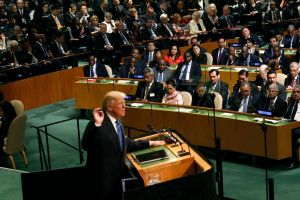Chicago Council Surveys conducted over the last several years (2014-2017) show remarkable stability of American opinion towards the Iran nuclear deal, both before and after the agreement was officially signed.
Introduction
In President Trump's first major speech before the United Nations General Assembly, he described Iran as a "rogue nation" and said the UN-backed nuclear agreement with Iran is an "embarrassment" to the United States. Despite this criticism, he has allowed sanctions relief for Iran to continue and his administration recertified the agreement last July. As the 90 day deadline for President Trump to recertify the Iran deal approaches in mid-October, a majority of Americans continue to support the agreement.
US Public Concerned about Proliferation
The American public is concerned about nuclear proliferation from both friendly and hostile nations. Six in ten (62%) say that "the possibility of any new countries, friendly or unfriendly, acquiring nuclear weapons" is a critical threat, below international terrorism (75%) and cyberattacks (74%). An even greater majority are concerned about North Korea's nuclear program (75% critical threat). When last asked in 2015, 57 percent of Americans described Iran's nuclear program as a critical threat.
Majority of Americans Favor US Participation in Iran Deal
Apparently, a majority of Americans believe the UN-backed nuclear agreement helps to deter this threat from Iran. Six in ten (60%) say that the United States should participate in the "agreement that lifts some international economic sanctions against Iran in exchange for strict limits on its nuclear program for at least the next decade," unchanged from 2016 (when it was also 60%).
The Iran agreement was a political football during the 2016 presidential primaries, with Donald Trump even threatening to tear it up. These partisan divides are equally apparent in public opinion. While 73 percent of Democrats favor participation, just one-half (48%) of Republicans agree (58% among Independents). Forty-four percent of core Trump supporters (those with a very favorable view of the president) think the United States should participate in the Iran deal, a relatively high number given the prominence with which Trump has attacked the deal.
Chicago Council Surveys conducted over the last several years (2014-2017) show remarkable stability of American opinion towards the Iran nuclear deal, both before and after the agreement was officially signed. Overall, about six in ten have supported the idea of imposed limits on Iran's nuclear development in exchange for sanctions relief. Partisan views have also remained consistent over the past several years, with Democrats and Independents consistently supporting the deal, while Republicans have been consistently divided roughly in half.
Methodology
The analysis in this report is based on data from the 2017 Chicago Council Survey of the American public on foreign policy. The 2017 Chicago Council Survey was conducted by GfK Custom Research using their large-scale, nationwide online research panel between June 27 and July 19, 2017 among a weighted national sample of 2,020 adults, 18 years of age or older, living in all 50 US states and the District of Columbia. The margin of error is ±2.4 percentage points.
Partisan identification is based on respondents’ answer to a standard partisan self-identification question: “Generally speaking, do you think of yourself as a Republican, a Democrat, an Independent, or what?”
Core Trump supporters are identified as those respondents who answered “very favorable” to the question: “Do you have a very favorable, somewhat favorable, somewhat unfavorable, or very unfavorable view of the following world leaders: US President Donald Trump?” This group, 21 percent of the overall sample, self-identify primarily as Republicans (62%), but also includes a third that identify as Independents (31%), and a handful of Democrats (5%).
The 2017 Chicago Council Survey is made possible by the generous support of the John D. and Catherine T. MacArthur Foundation, the Charles Koch Institute, the Korea Foundation, the Robert R. McCormick Foundation, and the personal support of Lester Crown and the Crown family.


